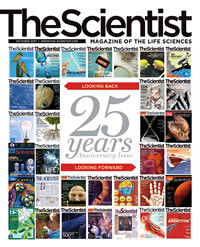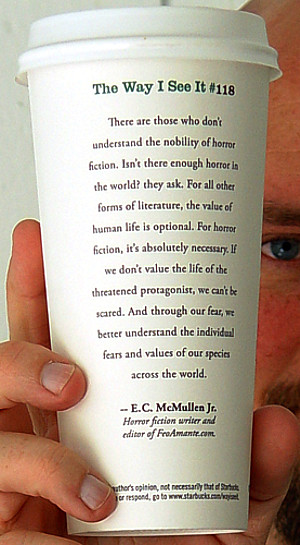SPOILERS AHEAD
!!!SCIENCE MOMENT!!!
BEWARE THE SCIENCE OF THESE TITLES FROM THE
2000s
| 1950s - 1960s - 1970s - 1980s - 1990s - 2000s | ||
| 2000 - 2001 - 2002 2003 to 2004 2005 to 2006 2007 to 2008 |
||
| EUREKA! 21 MOMENTS OF SCIENCE AND COUNTING! | ||
2000
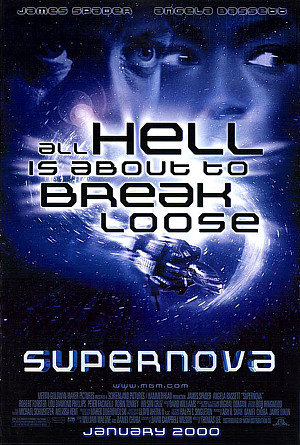
First, if you were ever unfortunate enough to be on board a spaceship involved in an asteroid collision, you would NOT live to tell the tale. Movies like this always portray asteroids like big boulders, bouncing off the ship. Actually they're more like 1000 ton rifle bullets. The difference in velocity between your ship and the average asteroid is likely to be measured in miles per second. Even a little one would ruin your whole day. Second, the "high gravity" field they're caught in is crap. Isaac Newton could have explained exactly what they needed to do to establish a nice, stable orbit. The equations are very straightforward and require only a pencil and a piece of paper (and a brain - feo). And third, there are blue giant suns. They're much more massive than our sun, which creates greater pressure in their cores which in turn makes them burn much hotter. Which is a real good reason not to get anywhere near them! They put out such intense heat and radiation they make our sun look like a night light. And yet this movie shows the intrepid space paramedics so close to the deadly blue sun that it practically fills the sky, yet it gives off no more light than a lava lamp! WRONG! |
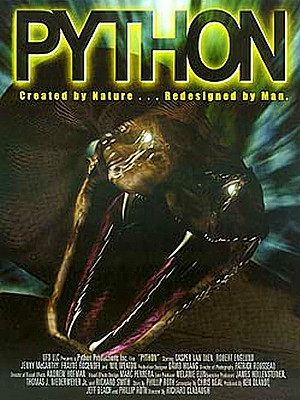
USA Release: AUG! 1, 2001 United Film Organization (UFO) Rated: Australia: M / USA: R The movie is vague on exactly what created this giant snake. At first you think Dr. Rudolf genetically engineered the monster but later we're told that Rudolf's company actually found it in South East Asia and assumed it was a mutant created by Agent Orange. If they'd just said they'd created it through genetic engineering and left it at that, I'd have been fine. Advanced genetic engineering will (sooner than you think) be able to create all kinds of custom animals and it's not a Godzilla sized snake – just a really big, tough, acid-spitting snake. But the inconsistent explanations (we made it – we found it – we won it in a raffle) are too annoying and I have to take points off for that.
No, Pythons do not have long venomous-type fangs as depicted on the DVD cover. They have no use for them. But since this is (supposedly) a genetically engineered python (maybe), I'm willing to let it go. Director Richard Clabaugh admits that "Python suffers from cinematic schizophrenia." and fully explains why at his site: |
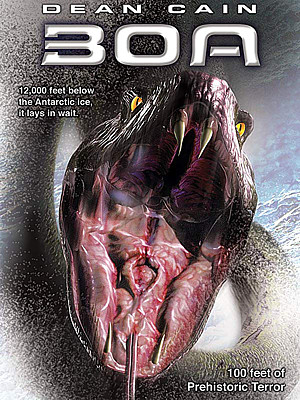
If a giant prehistoric snake were trapped in a nitrogen chamber it would perfectly preserve the beast. Dead. The snake's corpse wouldn't decay because the bacteria that cause organic decay can't live in pure nitrogen. Nitrogen is not "magical suspended animation gas." It's just a good preservative. And it's also not inert, as a character here describes. Helium is inert, in the sense that it doesn't participate in any chemical reactions. Nitrogen does. When Dr. Trenton sees the boa, he describes it as a "missing link." Really? Between what and what? Medium sized snakes and really, really big snakes? Clearly, "missing link" sounded to the screenwriters like something a paleontologist would say, even though Mr. Roth and Ms. Neish don't know what it means. A giant snake might be plenty hungry after a multi-million year nap, but like most big snakes it would probably only need one big meal a month. It would save most of the guards for later, assuming it was somehow warm enough (in Antarctica!) to move at all. Reptiles live in warm climates for a reason. |
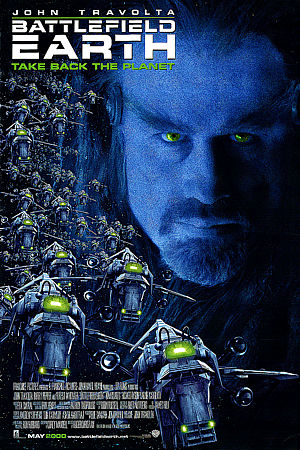
There's a long list of things wrong with the science in this movie but the worst offense has to do with a strange gas (only referred to as "breath gas" - Science was a difficult concept for Lafayette Ronald Hubbard to comprehend) that makes up a sizable portion of the Psychlo homeworld's atmosphere and that the Psychlo's will die without. This gas also explodes if exposed to radiation, which makes you wonder how the hell the homeworld has survived. Is it located in some magical area of space free of cosmic rays? In the billions of years it must have existed did a uranium-bearing meteorite never fall? And never once did any of the Psychlo's enemies ever think to exploit this incredible weakness? Also, I must mention that for a millennia old star faring civilization, the Psychlo technology isn't that impressive. Their weapons, computers, aircraft, etc. are just variations on our existing technology, leaving me wondering what their tech was like 1000 years ago when they conquered Earth. |
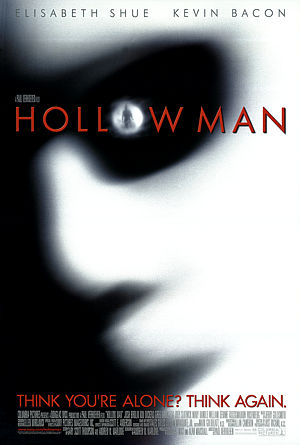
Much to my own surprise, I have very few objections to the science in this movie. Invisibility in the usual sense, basically being perfectly transparent, isn't really a workable idea because you wouldn't be invisible any more than very clear glass is invisible. Difficult to notice, sure, but that's all, much like the creature in the PREDATOR movies. However, THE HOLLOW MAN isn't transparent. Instead, he's been "quantum phase shifted" so he's out of synch with regular matter. What does that mean? Not a damn thing, but at least they made a pseudo-scientific effort which is all I ask. The one thing I will mention is something they point out in the movie but don't carry to its obvious conclusion. Sebastian is sensitive to light because his eyelids are transparent so he can't close his eyes. Alas, this also means his retinas are transparent so he'd suffer the fate of all invisible men: he'd be blind. So much for the girls' locker room. |
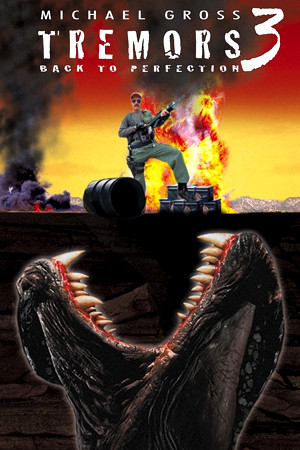
The Ass Blasters do have (sort of) a real equivalent in nature. The bombardier beetle has a similar ability and that's all I'll say about that. As far as the graboid and all its variations are concerned, this movie avoids the lame "Precambrian life forms" explanation given in TREMORS 2. However several times the monsters are referred to as "reptilians" which they certainly are not. |
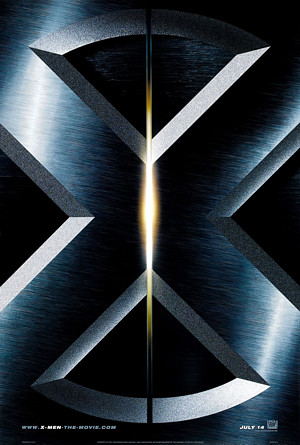
The mutants have a wide range of abilities, from Storm, who can control the weather, Cyclops,who can fire intense blasts of energy from his eyes, to Wolverine, who can heal instantly. But almost all of the mutant powers have one thing in common: they violate the Law of Conservation of Energy. Cyclops' beams represent a tremendous amount of energy. Where does it come from? Is there a nuclear power plant in his head? And for Storm to change the weather at will she would need enough power to heat a small country. Even Wolverine's ability represents impossibly energetic cell division. If he had a metabolism fast enough to do that he'd need to eat constantly and digest his food instantly. Don't take him to lunch! |
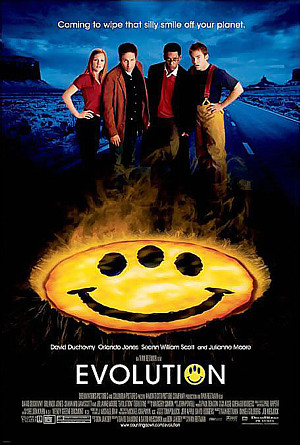
I swear to you, evolution is a simple concept. Creationists try to make it sound mystical and therefore unbelievable (and then they go to church and pray! The irony!) and movies like this play right into their hands by reinforcing the misconception that evolution is a magical force that makes life become more "advanced" until that pinnacle of evolution is reached: Me. I mean: Us. Sorry to burst your bubble but you are no more advanced a life form than a tree slug. Just because you're smarter doesn't mean you're more complicated. You and the tree slug are just adapted to different environments and given the time and the right environmental pressure, evolution could turn us into tree slugs and vice versa. Another thing to keep in mind is the answer to the creationist argument "If we evolved from apes, why are there still apes?" The answer is the theory of evolution does NOT say we evolved from apes. It says modern humans and modern apes have an ape-like common ancestor that lived about 7 million years ago. Humans are not "higher" on the evolutionary scale than chimpanzees. We're merely adapted to a different environment. |
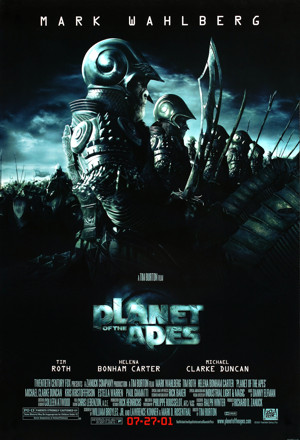
I must admit that the science here is actually better than the original in the sense that the explanation of why apes and humans live here and why they speak English sort of fits (I won’t ruin that surprise for you but whatever you think it is in the first few minutes - you’re right). Of course all the space-travel related details are as wrong as wrong can be. For example it's popular in movies like this to create an otherworldly feeling by putting multiple moons in the sky. That's fine as long as they move! Multiple moons means multiple orbits with different periods which means if you look at the sky a few hours later one moon may have moved a lot in the sky but the other may not have moved much at all. If they stay in the same relative position all the time it looks like the studio could only afford one matte painting. Still in SCIENCE MOMENT mode, I also have to point out that gorillas, chimpanzees and orangutans are separate species and would have no more romantic interest in each other than they do now. * Continued at SCIENCE MOMENT/Planet of the Apes - 2001 |
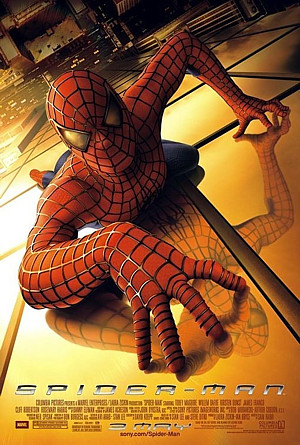
Lots of movies are made about good guys with super strength giving bad guys the beating they deserve, which is fine. But no movie has ever been made (to the best of my knowledge) that shows what a fight like this would really be like. The single spider-strength blow that Peter delivers to his bully, sending the bully flying down a hallway, would certainly have resulted in a shattered rib cage, massive internal bleeding, and one dead bully. The rest of the science here I'm willing to let slide, with two comments. First, a genetically engineered spider is vastly more believable than a mere "radioactive" spider as in the original comic. Second, if you want a much better movie about the genetic mixing of a human with a multi-legged nonhuman, watch Jeff Goldblum in THE FLY. |
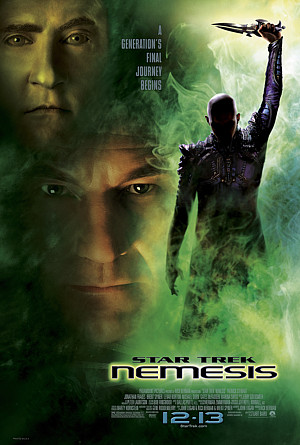
The show had plenty of the usual gaffs, like sound in space (Quick Plug for Firefly on FOX, the only SF series EVER to get it right – there is no sound in space). But I want to comment on something more general. This is supposed to be 300 years in the future. Think about what the world was like three centuries ago, not just in terms of technology but attitudes, beliefs, everything. My point is that for such a long time in the future, not much has changed. Other than a few magical plot devices like warp drive and transporters, their tech looks very familiar. I have a flat screen monitor just as good as the Captain uses. Maybe a little more imagination is in order? Just a thought. And mining slaves? That's a bad sci-fi staple but it's not very well thought out. A culture like the Romulan Empire wouldn't use slaves to mine ore. This has nothing to do with morality; it's simply, vastly, more efficient to use automated mining equipment than slaves. |
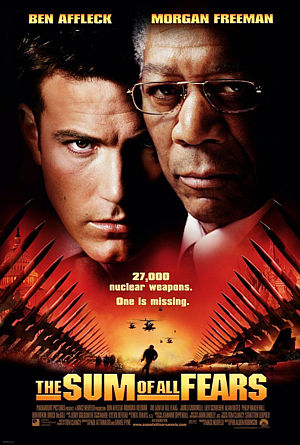
I'm not giving anything away when I tell you that the terrorist nuke is detonated in Baltimore, while the president is attending the Superbowl. That's in the TV commercial. Did you see the TV commercial? Well, then you pretty much saw the whole nuclear explosion. If you're going to make a movie about such a devastating event you should show how truly devastating it would be, but they decided not to go that way. Even the aftermath is severely downplayed, seen only in glimpses as Jack runs around the ruins of Baltimore, trying to catch a key bad guy. The science part is this: that ain't snow, Jack. That's fallout. Heroic Jack ignores warning after warning that he's in danger from the radiation but like a true hero he ignores the danger, not even donning a surgical mask to keep the very deadly dust out of his lungs. I hope his doctor girlfriend still likes him when all his hair falls out and he starts puking blood. |
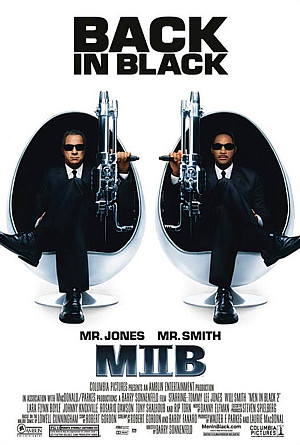
At one point a bad guy ally of Serleena mentions that he was in jail for stealing the Earth's ozone layer. "You know how touchy these humans are about global warming," he tells her, or words to that effect. This is a common mistake among the science illiterate. The depletion of the ozone layer (which is caused by chemicals called CFC's*) and global warming (which people suspect is caused by human industrial carbon dioxide output, though that has NOT been proved by any means) are two entirely separate, unrelated issues.
*A threat first discovered by Chemistry Professors Frank Sherwood Rowland and José Mario Molina-Pasquel Henríquez of the University of Irvine, California. In 1974 they presented their paper in the science journal, Nature, bringing notice of the threat to earth's ozone layer (Ozone - O3) from chloroflourocarbons (CFC - Chlorine, Flourine, Carbon). In 1995 they shared the Nobel Prize for Chemistry, along with Atmospheric Chemist, Paul Crutzen of the Max Planck Institute for Chemistry in Mainz, Germany, for their work on alerting the world to the danger of CFC. Today, the most prevalent ozone depleting chemical still in consumer and industrial use is Nitrous Oxide (N2O). While N2O occurs in nature, it is largely released by the burning of biofuels. |

Spielberg's vision of the future feels very real and the technical details are stunning and a little nightmarish. For example, every wall of every building is also a flatscreen monitor, projecting news, announcements and (mostly) ads. These aren't just any ads – they're intelligent ads that recognize you as you walk by and talk directly to you. “Hey, Kelly! You look like you could use a Budweiser.” Gah! Leave me alone! The glaring science error involves Gideon (Tim Blake Nelson), the prison warden. He's in a wheelchair. Mr. Spielberg's experts clearly didn't include any neurologists, because 50 years from now the only place you'll find a wheelchair is in a museum. We are so close to being able to regrow damaged nerve tissue that it's not even worth talking about. |
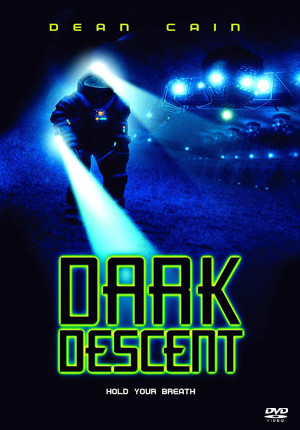
The Marianas Trench (located off the Marianas islands in the South Pacific) is almost seven miles deep. Think about that for a second. Seven miles of water above you. That means absolute pitch dark, cold and most of all: pressure. The pressure at sea level is about 14 pounds per square inch. At the bottom of the Marianas it's more like 16,000 pounds (8 tons!) per square inch. Even if you could design some kind of diving suit that would allow humans to walk around on the ocean bottom here, there's no way anyone would have the physical strength required to take off their helmet. Not that it would be difficult to kill yourself here. There is one very good scene where a drugged out miner takes a mining drill to the wall behind his bunk and lets the ocean in. The room is instantly filled with water and an emergency door irises shut. As it does a thin stream of water shoots through and kills a poor bastard who happens to be standing in its way, almost cutting him in half. Water under that kind of pressure will cut steel. The accuracy of the scene loses points though because one of the company personnel who responds to the emergency describes what happened as "Explosive Decompression". Wrong. If you're in space and a wall blows out that's explosive decompression. But here, since it's the outside pressure that's greater, what happened was Explosive Compression, not decompression. |
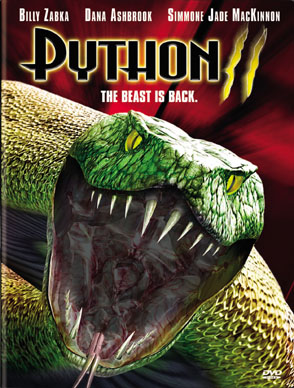
Anacondas are the largest snakes in the world and there have been unconfirmed reports that anacondas as big as the snake in this movie (80+ feet in length) actually exist. The largest confirmed specimen was 34 feet long. Anacondas are longer (and beefier) because they live in the water (which helps to support their weight), as opposed to the mostly tree-dwelling pythons. So an Anaconda would have made more sense here, but if you use the actual title of the movie you're ripping off, people notice. |
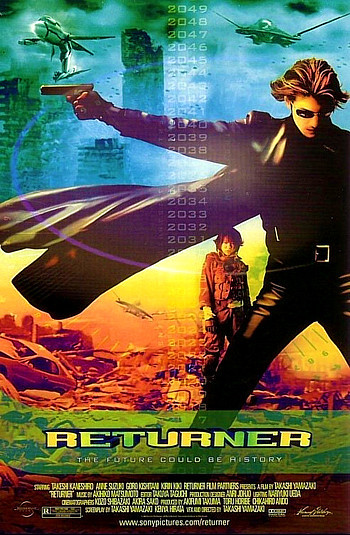
There's a little bit of scientific basis in the concept of time travel (in other words, it just might be physically possible). But even that bare possibility states that you could never go back to a time before your time machine was built. |
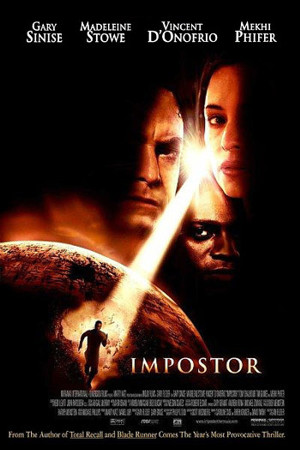
This is a movie about a glittery high tech future and there's a lot of cool tech toys displayed. That's why, by comparison, the ridiculously low-tech method of telling human from robot by using a heart-ripper-outer machine just seems stupid. He's a duplicate right down to his DNA? To every atom in every DNA molecule? I don't think so. Nanotechnology (which will absolutely change the world in the next 20 years or so) has been picked up by lots of sci-fi screenwriters as a magical plot device that they clearly don't understand. This is not how it works. Want to know more? Of Course You Do! |
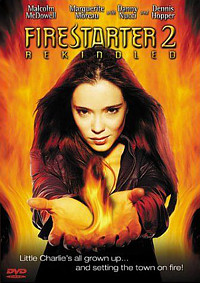
The movie does mention that the drugs (from "lot 6" that starts it all to the new and improved "Lot 23" in use twenty years later) work by activating genes on a specific chromosome and there is lots of work like that being done today, so kudos to the writer for reading a little science news before starting this job. Kudos. |
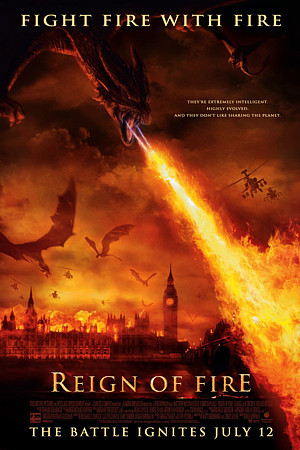
First, and foremost, there's just no way (unless you invoke magic, which the moviemakers do not) that an animal bigger than an elephant can fly by flapping its wings *. I'll spare you the equations but trust me. The wings would have to be many times bigger than pictured in this movie, which makes the muscle and bone strength requirements quite impossible. Only magic dragons can fly1. Second, even though we see several scenes of the dragons eating unburned people, we are told that their normal diet consists of ash, which is why they burn everything. No. Want to know more? Damn straight, you do! |
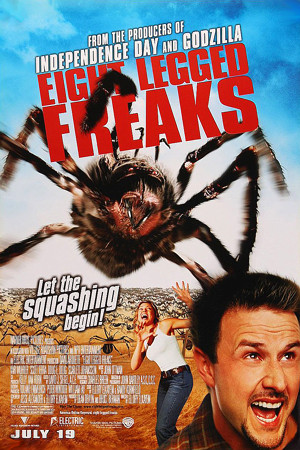
First, I refer you to my review of the movie THEM for a discussion of the square-cube law and why it makes giant bugs impossible. Second, spiders don't take a bite out of anything.* They either inject liquefying poisons and suck the juice or inject paralyzing poisons and suck the blood and other bodily fluids. The movie actually gets this right at first, but then forgets it. And third, a huge group of large predators like this would need way more food than the Arizona desert could supply, even if you include the townspeople. The spiders would starve in short order. *FeoNote: Except for plant eating spiders, which DO eat that way. |
Continue
to
2003
t0 2004
Back to
MOVIES
| FEO AMANTE'S HORROR THRILLER Created by: E.C.McMullen Jr. FOLLOW ME @ |
| Amazon |
| ECMJr |
| Feo Blog |
| IMDb |
| Stage32 |
| YouTube |
| Zazzle Shop |
Links To The FUTURE! MAN
CONQUERS SPACE BUZZ ALDRIN SCIENCE LINKS! BAD ASTRONOMY CENTER FOR THE STUDY OF SCIENCE FICTION MADSCI.org LINKS TO THE PAST! NASA.gov |



